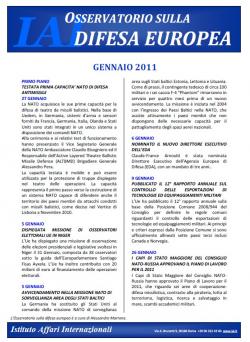Observatory on European defence, June 2003

3-4 June 2003
Meeting NATO and EU-NATO - Reforms, Missions and Capabilities
The meeting of the Foreign Ministers of the Atlantic Alliance was held in Madrid.
NATO approved the Alliance’s direct involvement in the ISAF mission in Afghanistan, as well as measures of support toward Poland for the dispatch of a military contingent in Iraq.
3 June was in particular dedicated to the meeting between NATO and the European Union and to the collaboration of the two institutions.
Of particular importance is the institution of the NATO-EU Capability Group, for the purpose of coordinating the development of military capabilities for the respective reaction forces.
An agreement has not yet been reached concerning the possible EU takeover of the NATO IFOR military mission in Bosnia.
Analogous themes were also later addressed by the NATO Ministers meeting on 12 June, dedicated to the operationalisation of the reforms measures taken in the Prague Summit, concerning the development of the NATO Response Force, the acquisition of new military capabilities and the restructuring of the Commands.
5 June 2003
European Council - EU Mission in Congo
The Council approved the Common Action concerning the beginning of the Artemis mission for the maintenance of peace in the Bunia area, in the Democratic Republic of the Congo.
It is the Union’s second military mission, the third mission in the ESDP framework.
The mission requires the deployment, on request of the United Nations (Resolution 1484), of some 1,500 servicemen in a restricted area, with the aim of stabilising a rapidly deteriorating situation due to ethnic conflicts.
The framework nation of the intervention is France and the Commander of the operation is the French General Neveux, while political control remains the responsibility of the PSC.
On 12 June, following Council’s approval, the first contingent was deployed. The mission is expected to end on 1 September, when a broader UN mission (MONUC) would have to take over from the EU one.
Though dealing with a restricted mission, limited in time and resources, the Union’s commitment in the Congo is rather significant, since it confirms the will to intervene well beyond the geographical borders of the European neighbourhoods.
Moreover, it adopts a modality of generation and the use of forces, structured on the adoption of a “framework nation” (in this case, France), that could well be resumed in the future.
The rapid preparation times of the mission should be positively stressed, as a proof of a growing political capacity to make decisions at the EU level, as well as of the readiness of the forces.
19-20 June 2003
European Council - Strategic Concept, ESDP Capabilities, Non-Proliferation Strategy
The European Council held in Thessaloniki on the occasion of the end of the Greek Presidency’s semester touched upon various questions of relevancy of the ESDP.
In particular, the Council received the document on the Union’s strategic concept presented by the High Representative Solana, inviting him to further his effort, with the intention of proceeding towards its adoption by year’s end.
The strategic document, entitled “A Secure Europe in a Better World”, proposes to confront the security problems by any means available to the Union (military ones included), for the purpose of promoting stability and law in the areas of European interest, thus reinforcing order and international institutions.
To allow the Union to play a global role in line with its economic and demographic weight, a greater coordination of national policies and an increase in the diplomatic and military capabilities at the EU’s disposal is deemed necessary.
The Council emphasised the recent developments of ESDP, declaring an operating capacity that consists of the full spectrum of Petersberg missions, but at the same time identifying areas that need improvements and promoting to this aim the creation, by 2004, of an intergovernmental Agency for the development, research, and acquisition of armaments.
Moreover, a document on the contribution to the fight against international terrorism and one on the non-proliferation policy of weapons of mass destruction (WMD) were adopted in which, apart from the strengthening of international control regimes, it is foreseen, as a last resort, the possibility of having to turn to coercive measures.
The transatlantic co-operation was the subject of a debate, in preparation for the EU-USA meeting of 25 June.
The European Council resumed and further investigated themes already discussed by the General Affairs and External Relations Council on 16 June.
The discussion within the Council produced two interesting documents: a draft of Strategic Concept for the Union and a strategy for the fight against proliferation of WMD that predicts the use of enforcement measures in multilateral frameworks.
The document proposed by Solana represents an important piece of news for Europe and will be the object of further study and refinement before its formal adoption on the part of the Council.
25 June 2003
Meeting EU-USA - Security and Defence
A meeting between the European Union and the United States was held in Washington, during which various issues relating to security and defence were addressed.
In particular, the principal arguments were the fight against international terrorism and the fight against the proliferation of WMD.
The conference saw a reconciliation among the various European and American positions, and it concluded with a joint statement in which the sides devote themselves to the strengthening of multilateral regimes of non-proliferation, though not excluding the necessity to sanction violators (with particular reference to the cases of North Korea and Iran).
The conference was preceded by a resolution of the European Parliament on 16 June, in which a global strategy for the improvement of transatlantic relations was urged to be defined, including security and defence issues.
-
Details
Roma, Istituto affari internazionali, 2003 -
Issue
03/06


